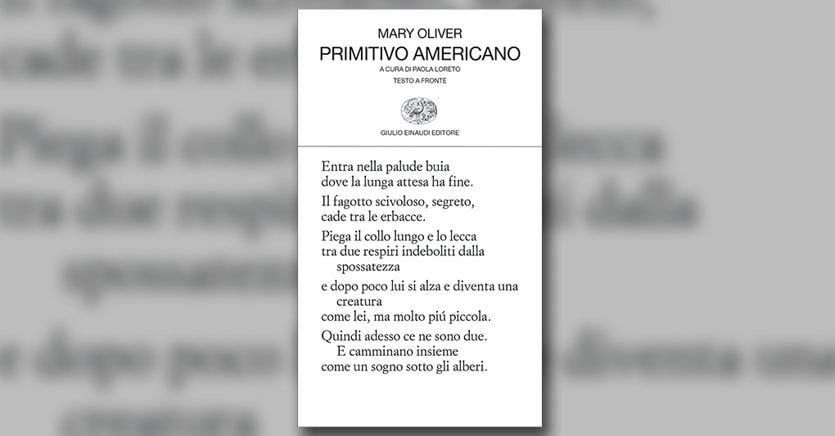Listen to the audio version of the article
Mary Oliver’s poetry can be attributed to the worldwide literary movement known as ecopoetry. Born in 1935 in Ohio and passed away at the age of eighty-three, Oliver was a very well-known and much-loved voice in the United States: his ecological thought, which links Whitman to Thoreau, garnered much acclaim and his anthologies were true and her own bestsellers, so much so that the New York Times defined her as “by far the best-selling American poet”.
A Dionysian book
Singer of the posthuman (as Jorie Graham would later become) and of wilderness as an ontological principle, Oliver sees Walserian (or Nietzschean) writing as a “walk”, the joyful proliferation of experiential states in contact with creation. In American Primitive – the author’s first collection translated in our country – we notice the purified gaze of wonder which is then synonymous with distance from the strictly pastoral genre and with “freshness of a perception”, as Paola Loreto observes in the solid introductory contribution to the text . «American Primitive – continues Loreto – is a Dionysian book, of abandonment to the excess of hunger, gluttony and desire; and it is a book of exultation in immersion in the disorderly and uncontrollable proliferation of nature.”
Exalting “primordial physical sensations” and “the metamorphosis of the non-human into the human”, Oliver envisages a panic fusion with the world not in the D’Annunzio meaning (aesthetic, so to speak), but by referring to Aldo Leopold’s land ethic, that is, to “earth ethics” which considers man as a simple citizen of it, like all the other elements (soil, water, plants, atmospheric agents) and all other creatures.
Symptomatic in this perspective is the poem Agosto, which opens the volume: «When the blackberries hang / swollen in the woods, in the brambles / that belong to no one, I spend // all day among the high branches /, stretching out / my scratched arms , thinking // of nothing, pressing / the black honey of summer / into my mouth; all day the body / accepts what it is. In the dark / streams that flow nearby there is / this big paw of my life that darts // among the black bellflowers, the leaves; there is / this happy language.”
The joy
In a Franciscan way, joy is on the side of intact originality; however, Oliver intends to reach a “pre-identity condition” capable of liquefying the boundaries of things and sacralizing everything, “the unknown, the unknowable / center”. This means that the importance of the bodily dimension in his poetic thought is crucial: in The Plums it is said that “the only way / to induce happiness in your mind is to introduce it / first into the body, like small / wild plums”.
